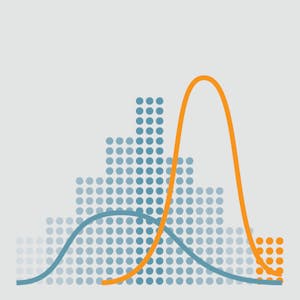Bayesian Statistics

$79
ENROLL NOWCourse Overview
This course describes Bayesian statistics, in which one's inferences about parameters or hypotheses are updated as evidence accumulates. You will learn to use Bayes’ rule to transform prior probabilities into posterior probabilities, and be introduced to the underlying theory and perspective of the Bayesian paradigm. The course will apply Bayesian methods to several practical problems, to show end-to-end Bayesian analyses that move from framing the question to building models to eliciting prior probabilities to implementing in R (free statistical software) the final posterior distribution. Additionally, the course will introduce credible regions, Bayesian comparisons of means and proportions, Bayesian regression and inference using multiple models, and discussion of Bayesian prediction. We assume learners in this course have background knowledge equivalent to what is covered in the earlier three courses in this specialization: "Introduction to Probability and Data," "Inferential Statistics," and "Linear Regression and Modeling."
Course FAQs
What are the prerequisites for 'Bayesian Statistics'?
Prerequisites for this continuing education class are set by Duke University. Most professional development online classes benefit from some prior knowledge. Please check the provider's page for specific requirements.
Will I receive a certificate for this CE class?
Yes, upon successful completion, Duke University typically offers a shareable certificate to showcase your new skills and fulfill your continuing education requirements.
How long does this online course take to complete?
Completion times for online continuing education courses vary. The provider's website will have the most accurate estimate of the time commitment needed.





